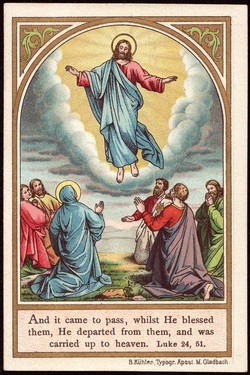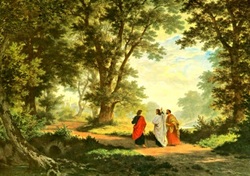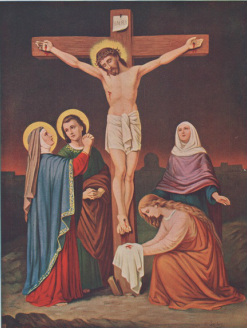
And He led them out as far as Bethania. How they must have thought as they followed Him up the slope of Olivet, of that night six weeks ago when He had led them from the Supper Room through the streets of Jerusalem to the scene of His lonely Agony, the beginning of His Passion. Now His sufferings are over, and He is going up Olivet to mount thence to His Throne. They pass Gethsemane. The glory of the noonday sun is on the olive trees beneath whose shade He prayed that awful night. Here is the path down which they came on the day of palms when He wept over poor Jerusalem. Higher and higher they go, and now they stand on the summit. He looks around. To the north is Galilee and Nazareth and the Lake. Six miles to the south, Bethlehem and the Cave. At His feet Jerusalem; and over there, Calvary and the Sepulchre. He thinks of all the glory to His Father, all the treasure for us, the three and thirty years of His Life on earth have won, and His Heart is full of joy. "It is finished," was His last thought on Calvary; it is His last on Olivet.
The time is come for Him to leave the earth, but He is long in bidding it farewell. His Mother is close to Him, and, pressing round, are His dear disciples, glad now, because they love Him, that He is going to the Father. For each He has a last word, the word He knows will reach the heart and meet the needs of each, and keep up faith and hope and love unto the end. And He said to them:
"Go ye into the whole world and preach the Gospel to every creature. He that believeth and is baptised shall be saved, but He that believeth not shall be condemned. And these signs shall follow them that believe: In My Name they shall cast out devils; they shall speak with new tongues; they shall take up serpents; and if they shall drink any deadly thing, it shall not hurt them; they shall lay hands on the sick, and they shall recover."
And after He had spoken to them, lifting up His hands, He blessed them. And, whilst He blessed them, He was raised up, and a cloud received Him out of their sight. And, while they were beholding Him, going up to Heaven, two men stood by them in white garments who said:
"Ye men of Galilee, why stand you looking up to Heaven? This Jesus, who is taken up from you into Heaven, shall so come as you have seen Him going into Heaven."
"And they adoring went back into Jerusalem with great joy." "And going forth they preached everywhere, the Lord working withal, and confirming the word with signs that followed."
We began this story of Jesus of Nazareth with the question of the persecutor Saul: "Who art Thou, Lord?" We end it with the cry of the heathen centurion, as, sore afraid, he stood in the noonday darkness beside the Cross:
"Indeed this Man was the Son of God!" This is the testimony borne by Heaven and earth and Hell itself to Jesus Christ. By the Angels singing in the midnight sky over Bethlehem. By the star that led wise men to His feet. By the Voice at His Baptism. By the winds and the waves of the stormy sea.
By the earth that gave up its dead at His word and shuddered beneath His Cross. It is the testimony of type and of prophecy, of His teaching, of His miracles, of His Resurrection and Ascension, of His divinely beautiful Character. It is the testimony of those who hated Him unto death and of the very devils themselves, as well as of those who in every age have loved Him and laid down their lives for Him with joy. It is the testimony of His Church to the end of time, of all who have eyes to see and ears to hear:
"Indeed this Man was the Son of God!"
Writing to his converts at Ephesus, St. Paul bade them hold fast the faith they had received, and beware of the false teachers who were come among them. As the soldiers of his time warded off an enemy's arrows by a shield that covered them from head to foot, so were these new Christians to "take the shield of faith wherewith to extinguish all the fiery darts of the most wicked one."
To you, the children of this twentieth century, the great Apostle would give the same solemn charge. There are men in these days who are trying to undo all that Jesus Christ has done, who deny whatever in His Life they cannot understand, and teach children that such facts as His Resurrection and Ascension could not have happened because they do not see how they happened. It is very wrong and very cruel thus to rob the little ones of their faith in Him who died to save them from sin and hell. Do not listen to such teaching. When men or women, companions, books or newspapers, would shake your faith in Jesus Christ—up, then, with the shield of faith:
"I believe in God the Father Almighty, Creator of Heaven and earth. And in Jesus Christ His only Son, our Lord." Cling to Jesus Christ. Let no one, let no thing separate you from Him. He alone, by His Precious Blood, can wash away your sins. He alone can comfort you when you are poor, or sick, or desolate. He alone can give you courage in the hour of trial, victory in temptation, and help in the awful hour of death.
When all desert you then, He will stand by you and keep you from harm if you have clung to Him all your life through as your Saviour and your Friend. Cover yourselves, then, with the shield of faith when danger threatens. Be glad that as children of the Holy Catholic Church you are preserved from the ignorance and the disbelief which is taking Jesus Christ out of the hearts and the lives of so many who are outside. Say to Him joyfully with Peter and with Martha:
"Thou art Christ the Son of the living God." And be not afraid to profess your faith boldly: Jesus is God! if on the earth this blessed faith decays, More tender must our love become, More plentiful our praise.
By your reverence in His Presence, by the frequency and the fervour of your Communions, by the observance of His Commandments and of the precepts of His Church, profess your faith in Him. And if at times it costs, as it most certainly will, to show yourselves the followers of Jesus Christ, look forward to that Day when He in His turn will confess you before the whole world. Remember that this Jesus, who has been taken up from us into Heaven, is to come again. Look forward to meeting Him with joy at His Second Coming, to being owned by Him then for one of His, according to His promise:
"He that shall confess Me before men, I will also confess him before My Father who is in Heaven and before the Angels of God."
THE END


 RSS Feed
RSS Feed